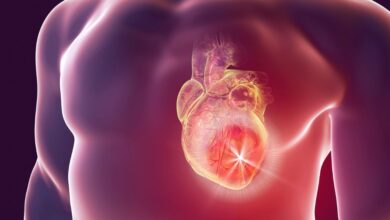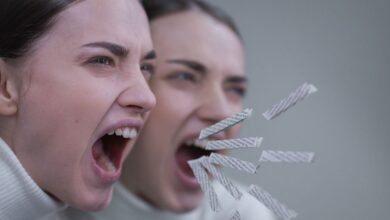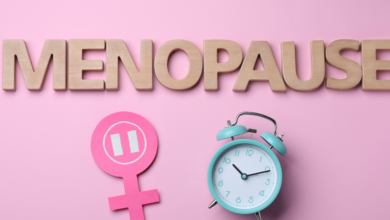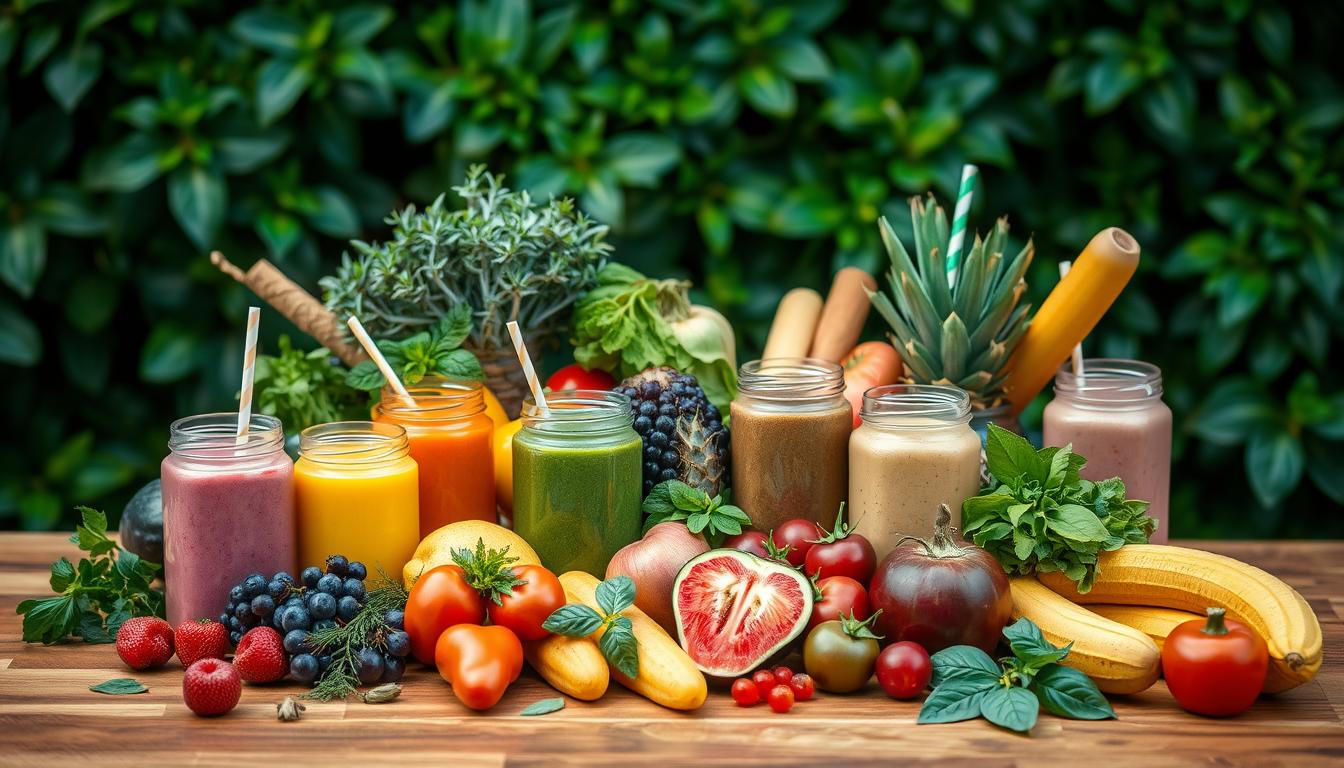
Detox diets have gained popularity as a means of cleansing the body and promoting weight loss. However, their effectiveness and health benefits remain a topic of debate. While some people claim positive results, scientific evidence supporting the efficacy and long-term effects of detox diets is limited. It is important to approach these diets with caution and consult a healthcare professional before embarking on any significant dietary changes. A detox diet aims to remove toxins from the body. It’s designed to improve health and well-being. Many people try detox diets to get rid of toxins and feel better.
Detox diets have become very popular. They promise to help the body get rid of harmful substances. But, do they really work, and are they good for you?
Detox diets are a big trend, with many wanting to try them. They aim to give the body what it needs while removing bad stuff. But, is there real science backing these diets?
We’ll look into detox diets and what they’re all about. We’ll talk about their benefits and risks. This includes how they might help you stay healthy and feel good.
By learning about detox diets, you can decide if they’re right for you. We’ll explore safe and healthy ways to detox. This way, you can choose the best detox diet for your needs.
Understanding Detox Diets: Basic Principles and Claims
Detox diets aim to remove toxins from the body. This idea has been around for centuries. It seeks to improve health and well-being.
The goal is to reset the body’s systems. This can involve dietary changes, supplements, and other therapies. Juice cleanses, fasting, and supplement-based detoxes are common.
What Defines a Detox Diet
A detox diet focuses on removing toxins. It often means avoiding processed or high-sugar foods. Instead, it encourages more fruits, vegetables, and nutrient-dense foods.
Common Types of Detox Programs
There are many detox programs, each with its own benefits. Some include:
- Juice cleanses: involve consuming only juice for a period of time
- Fasting: involve abstaining from food for a period of time
- Supplement-based detoxes: involve using supplements to support the body’s natural detox processes
Popular Detox Methods and Approaches
Popular detox methods include herbal supplements and colon cleanses. These support the body’s natural cleanse processes. They aim to improve overall health and well-being.
The Science Behind Body Detoxification
The human body has a natural detoxification process. It involves the liver, kidneys, and other organs working together. They remove toxins and waste products. Knowing how this works is key to understanding a detox plan.
The liver filters toxins from the blood. The kidneys help by removing waste through urine.
A good detox plan supports the body’s natural detox process. It can include dietary changes, lifestyle tweaks, and supplements. Key parts of a detox plan are:
- Eating more fruits, vegetables, and whole grains
- Drinking lots of water to flush out toxins
- Staying away from processed and high-sugar foods
- Exercising regularly to boost circulation and sweating
Some people believe in the benefits of a detox plan. But, it’s important to look at it critically. Knowing the science behind detox helps make better health choices.
A good detox plan fits an individual’s needs and health goals. Working with a healthcare professional is key. They can help create a detox plan that supports overall health.
Common Ingredients in Detox Diets and Their Properties
Detox diets use certain ingredients to help the body clean itself. These can be found in foods, supplements, and herbs. A good detox diet supports the body’s natural cleansing.
Key ingredients in detox diets include leafy greens and citrus fruits. These foods are full of antioxidants and fiber. They help the body detox naturally.
Natural Detoxifying Foods
- Leafy greens, such as kale and spinach
- Citrus fruits, such as oranges and lemons
- Other nutrient-dense foods, such as berries and nuts
Supplements and Herbal Components
Supplements like milk thistle and dandelion root are also used in detox diets. They help keep the liver and other detox organs healthy.
Liquid Cleanse Ingredients
Liquid cleanses, like juice fasts, use fruits, veggies, and herbs. These ingredients help detoxify and support natural cleansing. They are part of a healthy detox diet.
How Your Body Naturally Detoxifies
The human body has a natural way to get rid of toxins and waste. This is called a body cleanse. It involves different organs working together to remove harmful substances.
The liver is at the heart of this process. It filters toxins from the blood. The liver uses enzymes to break down these toxins, making them easier to get rid of. The kidneys also help by filtering waste from the blood and keeping the body’s fluid balance.
The Role of the Liver
The liver is key in breaking down toxins from pollutants and unhealthy foods. A healthy liver is vital for a cleanse and balanced body.
Kidney Function in Detoxification
The kidneys filter waste from the blood, which is then removed in urine. They also keep the body’s fluid balance right, which is key for detox.
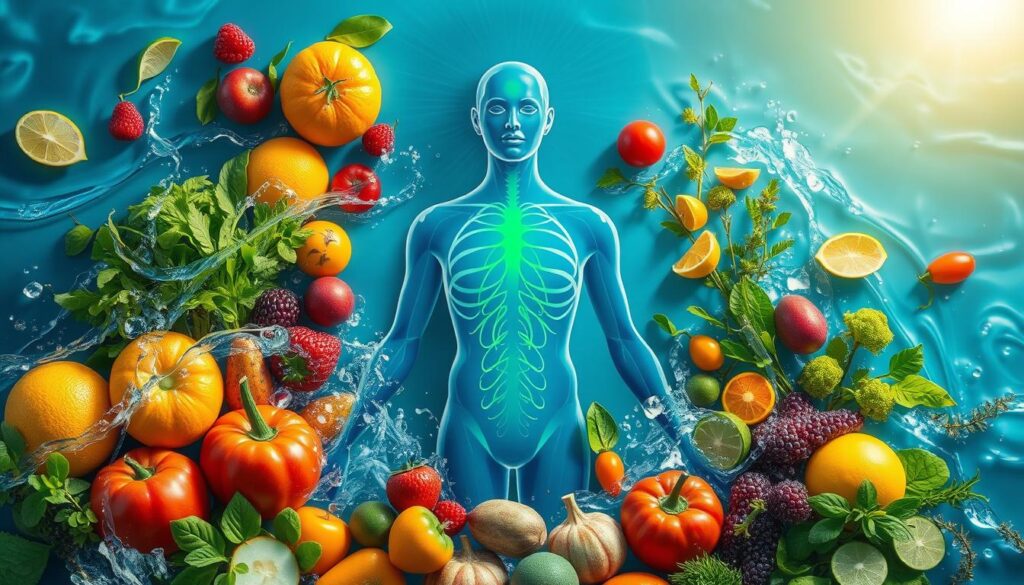
Other Natural Detox Mechanisms
Other organs like the skin and lungs also help with detox. The skin removes toxins through sweat, and the lungs do it through breathing. Knowing how the body naturally detoxifies helps us support this process and stay healthy.
Potential Benefits of Detox Diets
A well-planned detox plan can offer many benefits. These include weight loss, better energy, and clearer thinking. Many people choose detox diets to boost their health and happiness.
Detox diets can bring several advantages. Here are a few:
- Weight loss: Detox diets help by promoting healthy eating and cutting calories.
- Improved energy: They boost energy by cutting down on processed foods and sugary drinks.
- Enhanced mental clarity: Detox diets clear the mind by reducing toxins and promoting healthy eating.
But, detox diets aren’t for everyone. It’s key to talk to a healthcare expert before starting any new diet or detox plan.
In summary, a well-thought-out detox diet can greatly improve health and well-being. Yet, it’s important to be careful and seek advice from a healthcare professional before starting any new diet or detox plan.
Health Risks and Side Effects
It’s important to know the health risks and side effects of detox diets. Some people might see benefits, but others could face serious problems. Detox diets can cause dehydration, imbalances in electrolytes, and a lack of essential nutrients.
Detox diets can be risky if not done right. It’s key to understand the risks and take steps to avoid them. For example, pregnant women and people with certain health issues should not try detox diets.
Short-term Complications
- Dehydration and electrolyte imbalances
- Nutrient deficiencies, particularly in vitamins and minerals
- Headaches and fatigue
Long-term Health Concerns
Using detox diets for a long time can cause serious health problems. This includes malnutrition and damage to organs. It’s better to focus on balanced and sustainable detox methods, not extreme diets.
Who Should Avoid Detox Diets
Some people should not try detox diets because of health risks. This includes pregnant women, those with chronic health issues, and people on certain medications. Always talk to a doctor before starting any new diet or detox plan.
Scientific Research on Detox Programs
Looking into detox diets, it’s key to examine the scientific proof. Research on detox programs shows mixed results. Some studies suggest body cleanse programs might help, while others find no real benefits. It’s important to see how different cleanse methods affect our body’s detox processes.
Reviews of clinical trials and studies on detox diets show varied findings. Some focus on herbal supplements in body cleanse programs. Others look at how strict diets affect health. The outcomes depend on the detox program’s length, diet type, and who’s being studied.
- Limited evidence for the effectiveness of commercial detox products
- Potential benefits of certain dietary approaches, such as increased fruit and vegetable consumption, on overall health
- Importance of considering individual factors, like health status and nutritional needs, when evaluating cleanse programs
The scientific research on detox programs is not yet clear. While some body cleanse methods might help, more research is needed. It’s important to be cautious and informed when considering cleanse programs. Always weigh the risks and benefits and talk to health experts if needed.
Alternatives to Traditional Detox Diets
Looking for a better way to detox? There are options beyond traditional diets. A good detox plan can help your body detox naturally. It combines healthy eating, natural detox aids, and lifestyle changes.
Sustainable Healthy Eating Patterns
Eating a balanced diet is key. Include lots of fruits, veggies, and whole grains. Foods like leafy greens, citrus fruits, and omega-3s are great for a detox plan.
Natural Detoxification Support
Healthy eating isn’t the only thing. Natural supplements and herbs can help too. Think milk thistle, dandelion root, and turmeric.

Lifestyle Modifications
Changing your lifestyle can also aid detox. Regular exercise, managing stress, and getting enough sleep are important. Adding these to your detox plan boosts health and well-being.
How to Safely Approach Detoxification
When thinking about a detox diet, it’s key to do it safely. A detox diet should fit your personal needs and health. Always talk to a healthcare provider before starting any detox program. They can help you understand the risks and benefits.
Consulting Healthcare Providers
Healthcare providers can guide you on detoxification based on your health history. They suggest a balanced plan that includes healthy eating, exercise, and stress management.
Creating a Balanced Plan
A good plan should have lots of whole foods like fruits, veggies, whole grains, and lean proteins. Drinking plenty of water and avoiding sugary drinks is also important. Remember, a detox diet is for the long term, not just a quick fix.
Monitoring Your Body’s Response
Keep an eye on how your body reacts to detoxification and adjust as needed. Watch for changes in energy, digestion, and overall health. By being safe and responsible, you can avoid bad effects and get the most health benefits from detox diets.
Conclusion: Making Informed Decisions About Detox Diets
Detox diets are complex and often debated. Some people might see benefits from cleanses, but caution is key. It’s important to seek advice from experts.
There’s not much scientific proof that detox plans work long-term. They can even be harmful if not done right. It’s crucial to understand the risks.
When it comes to your health, make smart choices. Talk to doctors or dietitians to find a healthy detox plan. This way, you can support your body’s natural detox process.
By knowing the facts, you can choose what’s best for you. Your body can get rid of toxins on its own. Healthy habits like eating well, exercising, and managing stress are often better than strict detoxes.
Remember, your body is amazing at keeping itself clean. Focus on living a healthy lifestyle. This is usually better than trying extreme detoxes. Always think about your health and safety first.

